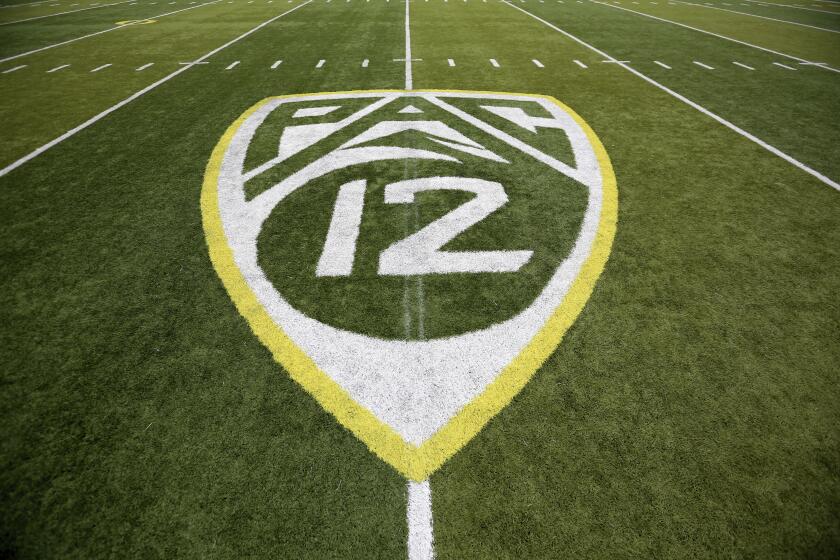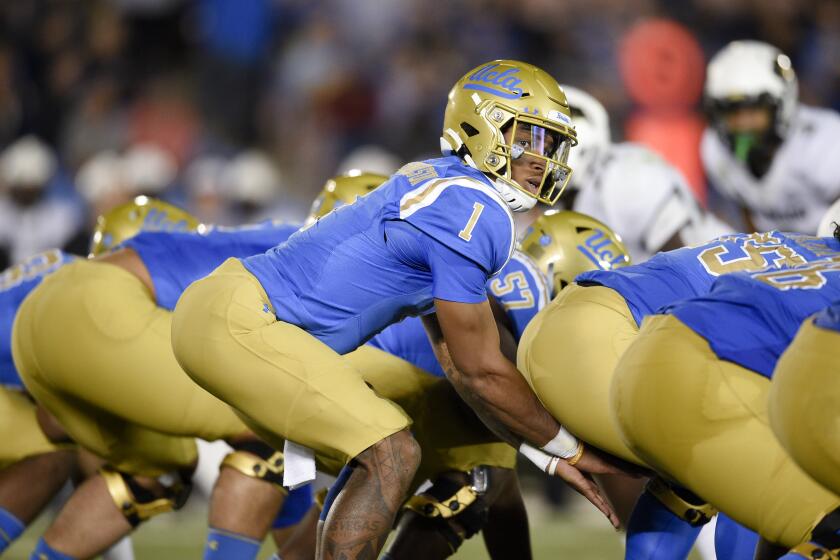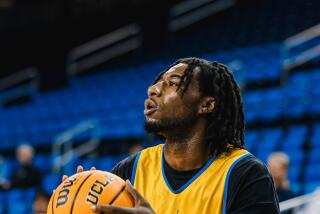Traveling is encouraged during UCLA’s virtual Dribble for the Cure
- Share via
Dribbling around UCLA’s campus has never looked anything like this.
You could walk the dog, jog on a treadmill or meander through your own neighborhood. Actually dribbling a basketball won’t be required. Neither will being anywhere near Westwood.
Welcome to a Dribble for the Cure unlike any other, the participants united to raise money for pediatric cancer research while doing essentially whatever they want.
The COVID-19 pandemic has necessitated a virtual format for the event that’s scheduled to start Oct. 6 with a five-day activity challenge allowing participants to familiarize themselves with a dribble app that’s compatible with wearable devices and cellphones. On Oct. 11, the day of the dribble, several hundred participants will complete a simulated course that usually starts at Drake Stadium and weaves through campus before finishing at Pauley Pavilion.
“The idea behind all of this is that even though we’re not together, we’re still together,” said Catherine Raack, a development associate at Pediatric Cancer Research Foundation. “Like, we can dribble together and be on the same road map to find a cure.”
The Pac-12 has announced a partnership with Fulgent Genetics to provide supplemental COVID-19 testing to every athletic department in the conference.
In another first, event organizers have enlisted participants from the Koll Co., an Irvine-based real estate developer that expects to have employees throughout California taking part. Other participants will hail from 11 states, including New York, Florida and Connecticut.
The Dribble for the Cure, which over the last decade has partnered with a sister event at St. John’s University, has raised more than $2 million since former Bruins shooting guard John Vallely spearheaded the first dribble in 2008 after enduring a one-two cancer gut punch.
Vallely’s daughter Erin died from a rare form of cancer of the soft muscle tissue at age 12 in 1991 and John overcame a bout with non-Hodgkins lymphoma that started in 2003. He’s been cancer-free for 14 years after undergoing two stem cell treatments, one involving a donor who was a winemaker from the outskirts of Frankfurt, Germany.
According to the American Cancer Society, 84% of children with cancer survive five years or more. In the 1970s, that rate was about 58%.
“Almost all of the kids are surviving the cancer, so we feel like we’ve had a major hand in this,” said Vallely, who won national championships at UCLA under coach John Wooden in 1969 and 1970. “I’ve stayed with it because my little girl was everything to me. I guess I’m somebody who wants to fight back.”
Vallely, who turns 72 on Oct. 3, has been joined in his fundraising efforts by fellow Bruins players Eddie Sheldrake, Art Alper and Jerry Norman, among many others. The hope is that this year’s event could set records for attendance and dollars raised because participation is not limited to those who can travel to campus.
Registration is $10 and participants are encouraged to fundraise individually or as part of a team, with 100% of the fundraising dollars going straight to research. Organizers say that every $50 raised supports an hour of research and every $25,000 raised allows a child to participate in a clinical trial that could lead to a therapeutic discovery.
UCLA says it will report the number of athletes, coaches and staff who have tested positive for COVID-19 on a weekly basis after previously not doing so.
Raack called the five-day activity challenge preceding the dribble to “the warmup before the big game,” and it should leave participants fully limber considering organizers have set a combined goal of 25,000 miles.
The dribble event is set for 2½ miles, matching the distance of the on-campus course that usually involves the men’s and women’s basketball teams surrounded by hundreds of others. As participants reach certain milestones based on a percentage of the course completed, they will hear from speakers including UCLA coaches, players and alumni in addition to pediatric researchers and two boys designated as honorary captains after being treated for cancer at UCLA Mattel Children’s Hospital.
Vallely channeled his old coach when he contemplated both the challenges and opportunities presented by the virtual format.
“My thinking is along the lines of the old Pyramid of Success,” Vallely said. “Give it your best and you don’t have to worry about the outcome.”
More to Read
Go beyond the scoreboard
Get the latest on L.A.'s teams in the daily Sports Report newsletter.
You may occasionally receive promotional content from the Los Angeles Times.













